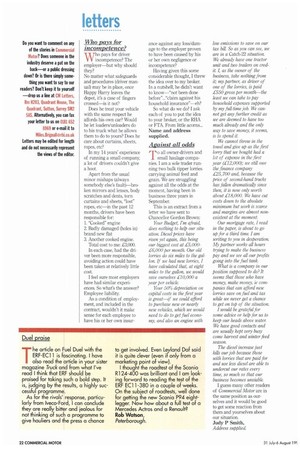letters
Page 24

If you've noticed an error in this article please click here to report it so we can fix it.
Who pays for incompetence?
Who pays for driver incompetence? The employer—but why should they?
No matter what safeguards and procedures (driver manual) may be in place, once Happy Harry leaves the depot, it's a case of fingers crossed—is it not?
Does he treat your vehicle with the same respect he affords his own car? Would he let loaders/unloaders do to his truck what he allows them to do to yours? Does he care about curtains, sheets, ropes, etc?
In my 14 years' experience of running a small company, a lot of drivers couldn't give a hoot.
Apart from the usual minor mishaps (always somebody else's fault)—broken mirrors and lenses, body scratches and dents, torn curtains and sheets, "lost" ropes, etc—in the past 12 months, drivers have been responsible for: 1. "Cooked" engine 2. Badly damaged (holes in) brand new flat 3. Another cooked engine.
Total cost to me: £3,000.
In each case, had the driver been more responsible, avoiding action could have been taken at relatively little cost.
I feel sure most employers have had similar experiences. So what's the answer? Employee liability.
As a condition of employment, and included in the contract, wouldn't it make sense for each employee to have his or her own insur
ance against any loss/damage to the employer proven to have been caused by his or her own negligence or incompetence?
Having given this some considerable thought, I threw the idea over to my broker. In a nutshell, he didn't want to know—"not been done before".,."claim against his household insurance"—eh?
So what do we do? I ask each of you to put the idea to your broker, or the RHA or ETA. From little acorns... Name and address supplied.
Against all odds
To all owner-drivers and small haulage companies. I am a sole trader running two bulk tipper lorries carrying animal feed and grain. We are struggling against all the odds at the moment, having been in business three years in September.
This is an extract from a letter we have sent to Chancellor Gordon Brown:
Your Budget, I'm afraid, does nothing to help our situation Diesel prices have risen yet again, this being our biggest cost at £5,000£6,000 per month. Our old lorries do six miles to the gallon. If we had new lorries, I have calculated that, at eight miles to the gallon, we would save ourselves I-10,000 a year per vehicle.
Your 50% depreciation on capital costs in the first year is great—if we could afford to purchase new or nearly new vehicles, which we would need to do to get fuel economy, and also an engine with low emissions to save on our tax bill So as you can see, we are in a Catch-22 situation. We already have one tractor unit and two trailers on credit. 1 as the owner of the business, take nothing from it, my partner, as driver of one of the lorries, is paid £550 gross per month—the least we can take to pay household expenses supported by my full-time job. We cannot get any further credit as we are deemed to have too much already and the only way to save money, it seems, is to spend it.
We cannot throw in the towel and give up as the first lorry that we bought had a lot of expense in the first year (112,000); we still owe the finance company £25,700 and, because the prke of second-hand trucks has fallen dramatically since then, it is now only worth about1.18,000. We have cut costs down to the absolute minimum but work is scarce and margins are almost nonexistent at the moment.
Our mortgage rate, I read in the paper, is about to go up for a third time. lam writing to you in desperation. My partner works all hours trying to make the business pay and we see all our profits going into the fuel tank.
What is a company in our position supposed to do? It seems that those who have money, make money, is companies that can afford new lorries save on fuel and tax while we never get a chance to get on top of the situation.
I would be grateful for some advice or help for us to keep our heads above water We have good contacts and are usually kept very busy come harvest and winter feed season.
The diesel increase just kills our job because those with lorries that are paid for and use less diesel are able to undercut our rates every time, so much so that our business becomes unviable.
I guess many other readers of Commercial Motor are in the same position as ourselves and it would be good to get some reaction from them and yourselves about our situation.
Judy P Smith, Address supplied




































































































